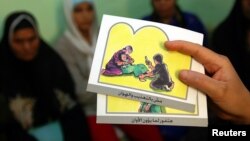As a child, Anne-Marie Caulkner was forced to undergo female genital mutilation, or FGM, which some people refer to as female circumcision.
The traditional practice removes some or all parts of the external female genitalia. It is seen by some as a rite of passage for girls and a way to make a girl more appealing to a husband.
Caulkner said the violation was so severe it prompted her to form her own nongovernmental organization, the National Movement for Emancipation and Progress (NAMEP). The group works with local communities to educate them about the dangerous effects of FGM, such as health complications.
On Saturday — the International Day of Zero Tolerance to Female Genital Mutilation — local leaders and residents of a community in the western part of Freetown were on hand to listen at an NAMEP event.
Chief Pa Foday Conteh has been to several of NAMEP’s discussions. He said that although FGM is a traditional practice, he understands how harmful it can be to girls. He is now talking more to men about it, but he said that changing a cultural mindset will take time.
"Some will say yes, some will say no, but as time goes on, I believe all of them … will say, yes, [ending FGM] is a good idea,”
Caulkner agreed: “We will not give up, because to any battle, there must be a challenge, there must be confrontation.”
The women who perform the cutting are known as sowies, and many see it is as a business.
Chief Kadiatu Ansu Khan is a sowie. She said that she understood the concerns of NAMEP but that financial challenges remain.
Speaking in her native Krio dialect, she said many people depend on the practice of FGM for their livelihood, and that it has helped them earn a good income.
NAMEP works with sowies to help them learn other life skills, such as tailoring.
International agencies like the U.N. Children Fund are also working to end FGM, along with the local government.
Sandra Lattouf, UNICEF's deputy representative in Sierra Leone, said that during the Ebola crisis, the government banned the tradition because of the issue of touching. The virus is transmitted through direct contact with bodily fluids. This led to a significant decrease in the practice.
“For the time being, the ban showed ... we can change behavior, and this is where we want, really, to work with the communities, sowies and all the leaders,” Lattouf said.
She added that ending FGM is included in the Sustainable Development Goals created by the United Nations to make progress in such areas as climate change and gender equality.






